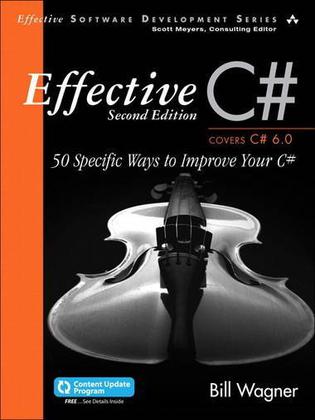 Effective C#txt,chm,pdf,epub,mobi下载
Effective C#txt,chm,pdf,epub,mobi下载作者: Bill Wagner 出版社: Addison-Wesley Professional 副标题: 50 Specific Ways to Improve Your C# 出版年: 2016-12-22 页数: 288 定价: USD 44.99 装帧: Paperback ISBN: 9780672337871 内容简介 · · · · · ·In Effective C#, Third Edition, respected .NET expert Bill Wagner identifies 50 ways to harness the full power of the C# 6.0 language to write exceptionally robust, efficient, and well-performing code. Reflecting the growing sophistication of the C# language and its development community, Wagner has identified dozens of new ways to write better code. This edition’s new solution... 作者简介 · · · · · ·Bill Wagner creates .NET learning materials for Microsoft. He is one of the world’s foremost C# experts and is a member of the ECMA C# Standards Committee. The president of Humanitarian Toolbox, he also now serves on the .NET Foundation Advisory Council and Technical Steering Committees. Wagner has worked with companies ranging from start-ups to enterprises, improving developme... 目录 · · · · · ·Table of ContentsIntroduction xiii Chapter 1: C# Language Idioms 1 Item 1: Prefer Implicitly Typed Local Variables 1 Item 2: Prefer readonly to const 7 Item 3: Prefer the is or as Operators to Casts 12 · · · · · · () Table of Contents Introduction xiii Chapter 1: C# Language Idioms 1 Item 1: Prefer Implicitly Typed Local Variables 1 Item 2: Prefer readonly to const 7 Item 3: Prefer the is or as Operators to Casts 12 Item 4: Replace string.Format() with Interpolated Strings 19 Item 5: Prefer FormattableString for Culture-Specific Strings 23 Item 6: Avoid String-ly Typed APIs 26 Item 7: Express Callbacks with Delegates 28 Item 8: Use the Null Conditional Operator for Event Invocations 31 Item 9: Minimize Boxing and Unboxing 34 Item 10: Use the new Modifier Only to React to Base Class Updates 38 Chapter 2: .NET Resource Management 43 Item 11: Understand .NET Resource Management 43 Item 12: Prefer Member Initializers to Assignment Statements 48 Item 13: Use Proper Initialization for Static Class Members 51 Item 14: Minimize Duplicate Initialization Logic 53 Item 15: Avoid Creating Unnecessary Objects 61 Item 16: Never Call Virtual Functions in Constructors 65 Item 17: Implement the Standard Dispose Pattern 68 Chapter 3: Working with Generics 77 Item 18: Always Define Constraints That Are Minimal and Sufficient 79 Item 19: Specialize Generic Algorithms Using Runtime Type Checking 85 Item 20: Implement Ordering Relations with IComparable<T> and IComparer<T> 92 Item 21: Always Create Generic Classes That Support Disposable Type Parameters 98 Item 22: Support Generic Covariance and Contravariance 101 Item 23: Use Delegates to Define Method Constraints on Type Parameters 107 Item 24: Do Not Create Generic Specialization on Base Classes or Interfaces 112 Item 25: Prefer Generic Methods Unless Type Parameters Are Instance Fields 116 Item 26: Implement Classic Interfaces in Addition to Generic Interfaces 120 Item 27: Augment Minimal Interface Contracts with Extension Methods 126 Item 28: Consider Enhancing Constructed Types with Extension Methods 130 Chapter 4: Working with LINQ 133 Item 29: Prefer Iterator Methods to Returning Collections 133 Item 30: Prefer Query Syntax to Loops 139 Item 31: Create Composable APIs for Sequences 144 Item 32: Decouple Iterations from Actions, Predicates, and Functions 151 Item 33: Generate Sequence Items as Requested 154 Item 34: Loosen Coupling by Using Function Parameters 157 Item 35: Never Overload Extension Methods 163 Item 36: Understand How Query Expressions Map to Method Calls 167 Item 37: Prefer Lazy Evaluation to Eager Evaluation in Queries 179 Item 38: Prefer Lambda Expressions to Methods 184 Item 39: Avoid Throwing Exceptions in Functions and Actions 188 Item 40: Distinguish Early from Deferred Execution 191 Item 41: Avoid Capturing Expensive Resources 195 Item 42: Distinguish between IEnumerable and IQueryable Data Sources 208 Item 43: Use Single() and First() to Enforce Semantic Expectations on Queries 212 Item 44: Avoid Modifying Bound Variables 215 Chapter 5: Exception Practices 221 Item 45: Use Exceptions to Report Method Contract Failures 221 Item 46: Utilize using and try/finally for Resource Cleanup 225 Item 47: Create Complete Application-Specific Exception Classes 232 Item 48: Prefer the Strong Exception Guarantee 237 Item 49: Prefer Exception Filters to catch and re-throw 245 Item 50: Leverage Side Effects in Exception Filters 249 Index 253 · · · · · · () |
 首页
首页



以前买过
怎么说呢,感觉这本书涉及的方方面面太多
颠覆了本人固有浅薄的世界观、价值观
好好好好好